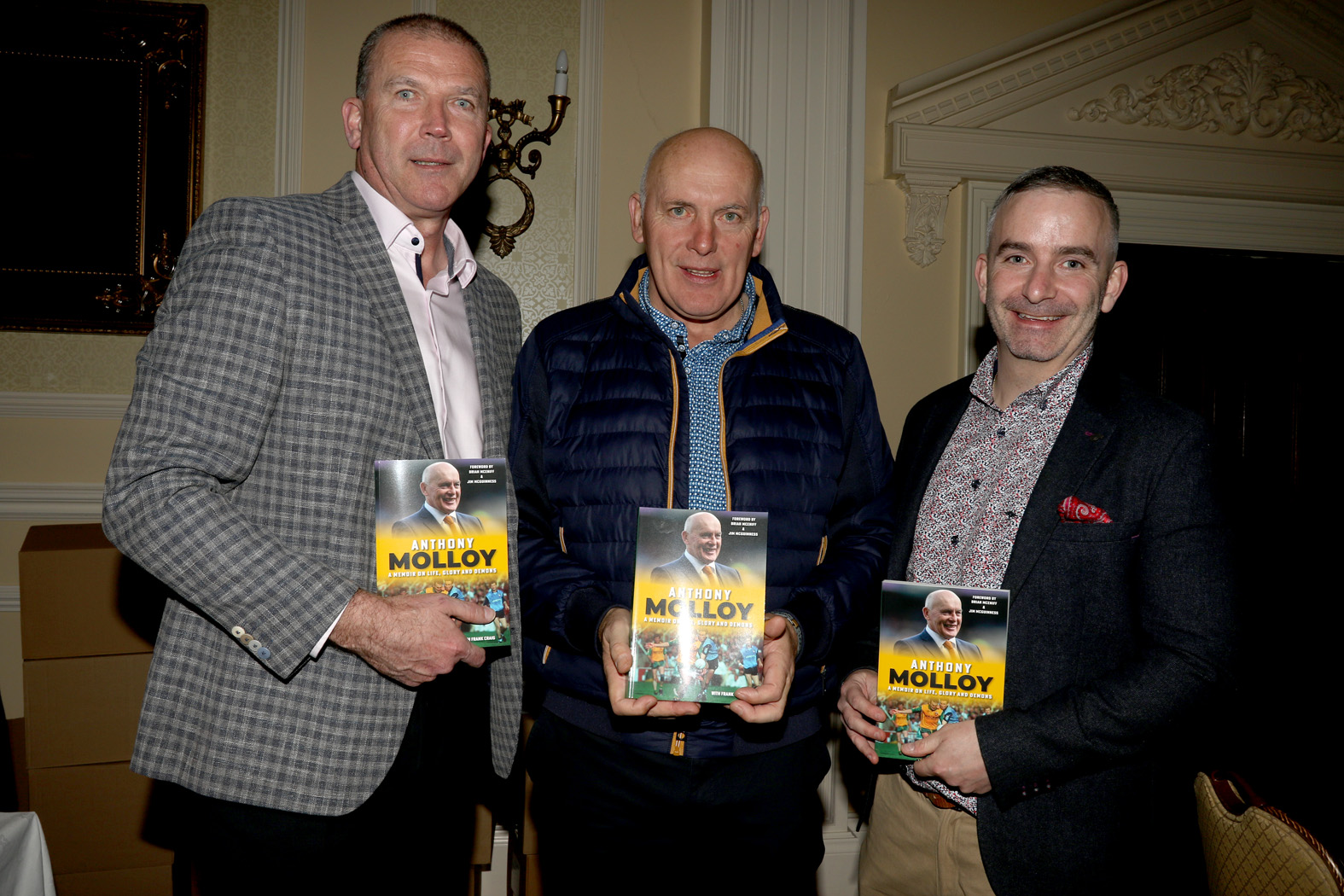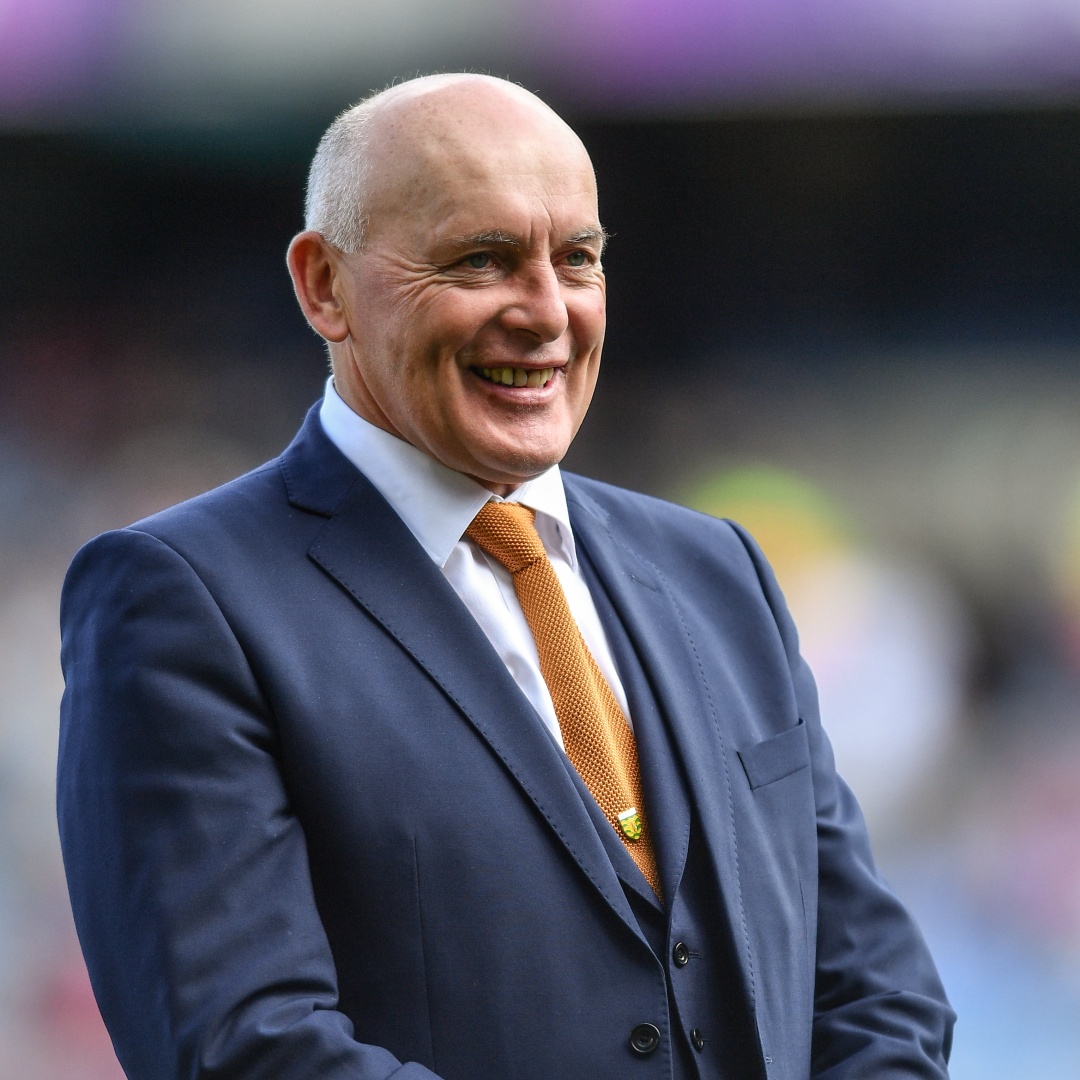
Anthony Molloy of Donegal is tackled by Liam Hayes of Meath during the 1990 All-Ireland SFC semi-final
Prior to the launch of Anthony Molloy’s book in the Blue Haven on Friday night last, I got the opportunity to interview another legend of the game, Liam Hayes of Meath.
My first question elicited a telling reply. ‘When did you first encounter Anthony Molloy?’, I asked. “Suddenly,” replied Liam Hayes.
Hayes revealed that they were top of the order at the time but were blindsided by the arrival of Donegal on the scene, a side led by Molloy. The former Meath All-Ireland winning footballer and award winning journalist was in the Blue Haven for the launch of ‘Anthony Molloy: A Memoir of Life, Glory and Demons’, an autobiography of the big Ardara legend.
Hayes’s publishing company, Hero Books, were the publishers of the book, and the Meathman said he was privileged to be involved.

“I was part of the Meath team through the ‘80s and ‘90s and we fought long and hard to get to the top of the mountain,” he said. “We got over Dublin after two or three attempts and then we finally got a couple of All-Irelands in 1987 and 1988.
“And when you do that, you are top of the heap and you are sort of looking around to see who’s going to knock you off. We were unsuspecting of Donegal, we didn’t think it was going to be Donegal.
“But two years before the All-Ireland of 1992, we met Donegal with a bang. They hit us twice, in a National League quarter-final where we scored two late goals to get by, and then in the All-Ireland semi-final that year in Croker, Donegal again were the better team but we got two late goals to get through.
“I was just talking to [former Meath manager] Sean Boylan this morning and we were reminiscing about those two games and we were unsuspecting, we didn’t know the force that was coming. You were always keeping one eye on Dublin coming again, but Donegal were a massive team, massive power.”
Having been privileged to be involved in the book, Hayes said, which gave a real insight to what Donegal were about back then.
Click here to buy 'Anthony Molloy An Autobiography: A memoir on life, glory and demons'
“But it is only as publisher of Anthony’s Memoir, I wanted to edit the book myself because I had lived through those days,” Hayes added. “And I got a real sense in editing the book of what was happening in the Donegal camp; the key players that were emerging with Anthony as the leader.
“If I had known then what I know, we would have been prepared for Donegal. On those two occasions in 1990 it was just wise old heads that got us through. Anthony in the middle of the field was just a powerhouse. There were a lot of big powerful players and very skillful players up front but it was the middle of the field with Anthony and Martin Gavigan. I got to know him very quickly, very painfully and I suddenly knew he was.
“In the book he talks of being at his peak in 1990. And as I say that’s when I first met the man as a footballer. In that 1990 All-Ireland semi-final in Croke Park, to give you a sense of how lucky we were to get out of it. We were struggling to command the game, we were reacting to everything that Donegal were doing. In the second half Sean Boylan sent in a slip of paper for Colm O’Rourke to come off. That was the sign of the panic of the team.

“But he refused to come off. He said ‘I’m not coming off’. There was consternation. This was during an All-Ireland semi-final. The paper was changed to Colm Brady, who was playing midfield with me. So Colm Brady was taken off and he was actually playing quite well.
“That gives you a sense of the degree to which we were unsettled and on the ropes in that game. It’s all about inches. If Donegal had won that, would they have won two or three All-Irelands, possibly.”
Hayes agreed that football back then was much different to now and the midfield battle was the first and foremost that needed to be won.
“It was primal,” he said. “And when you look back at our age now, you could be guilty of saying it was Stone Age football. It wasn’t, there was a lot of good football played, a lot of tactical awareness. But the game was broken down into sections, defenders stayed where they were, forwards stayed where they were and midfield was a battle. It was a battle of winning primary possession. And so it was basically two against two.
-1667468664288.jpg)
“In those days if you lost midfield, you were going to lose the game. You would ask why did managers leave it down to that big battle, like two heavyweights in a boxing ring going head to head. One guy gets knocked out, it's all over.
“Back then the game was ferocious, especially the first 15 or 20 minutes, and Anthony talks about this in the book. Everything was thrown into the first 15 or 20 minutes and if you weren’t prepared for that, you had no chance. To be honest when I look back at my own career; I played for Meath when I was 18, and hand on heart I didn’t have my wits about me and I didn’t know what the game was about until I was 23 or 24.”
Molloy had come through the ranks, winning an All-Ireland U-21 in 1982 and a first Ulster title a year later. And he was a leader in the team at an early age.
“He was not just a leader, when you read the book you understand the damage to his knees and the pain threshold he had to live through all the time,” said Hayes, adding that you get a sense of the leader that he was when he was willing to go through the pain barrier not just to play but to go out training. That was setting the bar so high for everyone else around him.”
Hayes talks about how 1991 almost ended Molloy’s career and his meeting with Brian McEniff to sort out their differences.
“It could have gone either way for Anthony and he had an awareness that his career was coming close to the end,” Hayes said. “He became the best midfielder in the country for a one or two year period. He was the benchmark for everyone around.
“It’s amazing that his book has never been written before. But that’s common with a lot of lads. I don’t think he would ever have been prepared to write his book and certainly he wouldn’t have been prepared to write it as courageously and honestly as he has written it now. Because this is a massively personal and honest book.
-1667468699913.jpg)
“He used the word inhumane after Donegal won the All-Ireland. And he’s not looking for sympathy in relation to that, but his life for the next six, 12, 18 months was inhumane because there was no control of it.
“Honestly, there were no templates at all then. It was just make it up as you go along, for everybody. But especially for an All-Ireland winning captain.”
Speaking about the highlight of Molloy’s career - the All-Ireland win in 1992 - Hayes feels when reading the book, the win was not a surprise to Donegal.
“You get a sense of how unaware and unsuspecting Dublin were in 1992,” he said. “Dublin were innocent. When you look back now, there was no way Donegal were going to lose that game. Dublin thought they had a divine right to win it, they were parading around the place, doing gigs and all sorts of PR stuff. They were setting themselves up.
“Anthony was just destined to lift the Sam Maguire. And I think Donegal knew that. They knew it was their turn.”
Hayes believes that leaders like Anthony Molloy are born into the role.
“There are certain people who are born for that role, assume that role,” Hayes said. “I know in the Meath team I was made captain in 1991 and it wasn’t a role that suited me. It wasn’t a role that I enjoyed. There were four or five big generals in our team and I wasn’t one of them. I struggled with it all through 1991 and we got to the All-Ireland final. It’s a touch that some people have.”
Hayes feels that to win anything you have to have those generals. “When I look at teams I look at the number of generals they have, the number of geniuses they have,” he said. “ Kerry have a load of geniuses at the moment but they are preciously short of generals. Any of the big teams or great teams had generals and geniuses. Donegal had two or three geniuses up front and they had three or four generals in the middle third of the team.”
Hero Books publishes between 20 and 30 books every year. So where does Anthony Molloy’s book stand? Hayes had much praise for author Frank Craig for the work he did along with Anthony Molloy in writing the book.
“My job was just to edit the book, finesse it,” Hayes said. “This is one of the most honest, courageous, important GAA books that we have published. And I say that genuinely. Anthony pours his heart and soul into the book. So it is an important book, not just to mark the 30th anniversary of the 1992 victory, it is also important on a human level, because he talks about his life, about being successful. He talks about climbing to the mountain top and then the painful descent.
_Cropped-1667468745415.jpg)
“It’s always the descent that is the most difficult thing, getting to the top is easy compared to the descent in mountaineering and in life. Anthony has gone through his tough, tough years. All people in Donegal and Ulster are going to love it because it brings them back into that glorious era, when there were some amazing teams; the Derry team of that era, the Down team.
They were some of the best GAA matches ever played.
“The book is also important about life, about not giving up, about fighting through. It’s a really important book and from our point of view it is one of the most important books we have ever published.
Subscribe or register today to discover more from DonegalLive.ie
Buy the e-paper of the Donegal Democrat, Donegal People's Press, Donegal Post and Inish Times here for instant access to Donegal's premier news titles.
Keep up with the latest news from Donegal with our daily newsletter featuring the most important stories of the day delivered to your inbox every evening at 5pm.